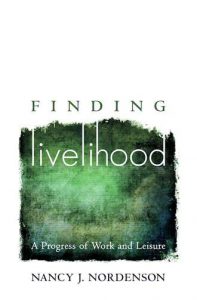Finding Livelihood (Nancy Nordenson, 2014)

Contemplating work and rest
I’m not certain I can describe this clearly, but I’ll try. There are two sorts of nonfiction books worth reading. The first sort are good because they help us think something through and we see more clearly, even if we feel a bit overwhelmed at the end. And then there are books that accomplish all that while also refreshing our souls in the process. The thinking and clarity are served with a measure of gracious solace that reassures and awakens a sense of hope. In the end steps of action do not intimidate because we are changed somehow, and though we and the world remain broken we have been freed to stumble more eagerly into grace.
Finding Livelihood is the second sort of book. Author Nancy Nordenson helps us think about work and leisure by inviting us to enter a place of wisdom, to breath deeply, and to dwell there. Her way of welcome to that place is serious and realistic yet contemplative and life affirming, lyrical and healing.
Nordenson divides Finding Livelihood: A Progress of Work and Leisure into three acts:
ACT I. Where we encounter ground level and metaphysical realities; unfair rules, job stress, and bad bosses; idealistic work experts and criteria for “good work”; hiddenness and exhaustion; and a longing for meaning and a will to be satisfied. [p. 9]
ACT II. Where we encounter rest and contemplation; time and space; beauty, prayer, and faith; imagination; an urge for freedom; a dual job description; people and moments worthy of pause; bills that keep coming and a pink slip. [p. 67]
ACT III. Where we encounter love, devotion, and guidance; the sacrament of the present moment and every moment; a never-ending journey; prayer, grace, and surrender; strength; two views of time; patience and transformation; and a blessing of countenance. [p. 151]
Even if we understand and believe the scriptures concerning vocation and rest, it is a struggle to consistently live in that reality in our modern world. That shouldn’t be surprising, since, as St. John tells us, “all that is in the world—the desires of the flesh and the desires of the eyes and pride in possessions—is not from the Father but is from the world” (1 John 2:16-17). The world, our world, in other words, composes itself in great systems that agitate against everything—including our vocation and rest, work and leisure—that might display even a hint of the harmony of God’s kingdom.
Even the often quoted and highly respected advice of theologian and writer Frederick Buechner is problematic: “the place God calls you to is the place where your deep gladness and the world’s deep hunger meet.” While Buechner’s words, an amplification of a sentiment first voiced by Aristotle, offer a starting point for dreams and plans when the future is in front of you and the choice is yours, who but a very small minority can find that exact intersection and from it feed a family? Or at that sweet spot sustain their position for a lifetime? Glance at history or literature and count the heroes who are swept into events not of their choosing, sometimes kicking and screaming. Consider the pivotal, but sometimes hidden, events visited upon the common man or woman who work far from deep gladness, the world’s greatest need, or both.
This book is not about the modern work ethic. It is not a celebration of work, but neither is it an exposé or complaint. This book is about wrestling with work as with any large and powerful force that wants to have its way with you while you simultaneously want to have your way with it. This book adds another view to the body of literature about work. It adds nor just another way of thinking about the experience of work bur another voice, a meditative and contemplative voice, a voice trying to speak into the tension between passion and need, between aspiration and limits, between the planned life and the given life. [p. 6]
We warmly recommend Nancy Nordenson’s superb Finding Livelihood to you.

